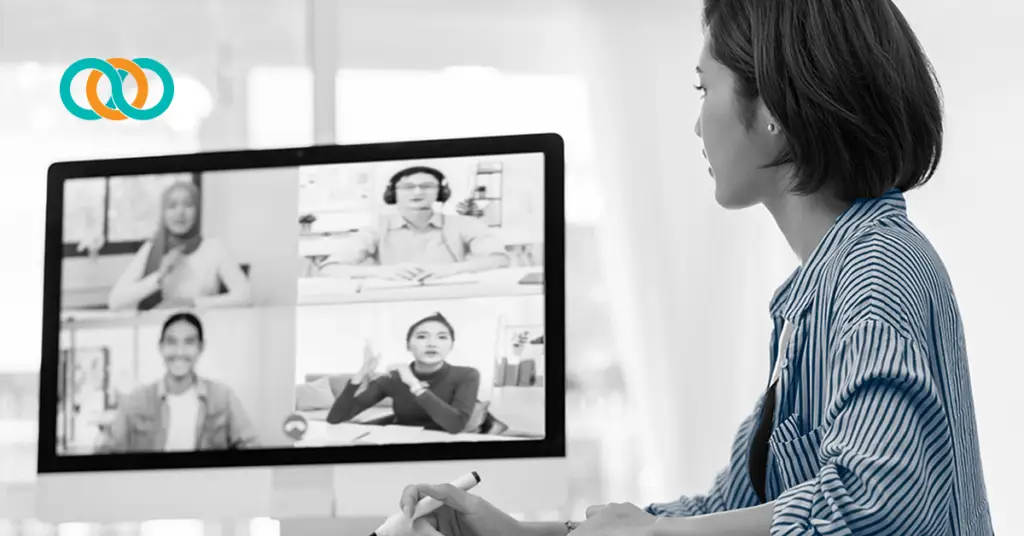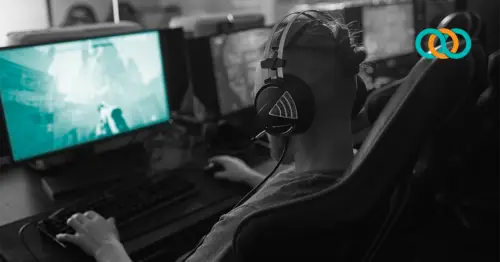Every day people attend virtual meetings, training classes, and other events. Some of them turn out great, and some not so much. Have you ever wondered why some virtual sessions run so smoothly?
Most likely, it is thanks to an unsung hero running the show behind the scenes, a Virtual Classroom Producer. Think about events you’ve attended where a single person was responsible for both the presentation duties and technical aspects; more than likely, there were some hiccups or rough patches involved.
Now, imagine yourself in the role of that facilitator. However, in this scenario, you have to drive a car while leading the meeting…on your mobile phone…where you are also screen sharing your presentation. Focus — eyes on the road! Remember to concentrate on the topic you are presenting. Speak clearly and be succinct so those listening to you understand your point. And, oh yeah, don’t forget to change the slide on your phone when it is time.
Stop! Someone just interrupted you with a “quick” question that just so happens to be off topic. Watch out; the driver in front of you suddenly tapped the brakes!
It sounds more like a scene from a sitcom.
As humorous and far-fetched as this type of chaotic scenario may seem, it is not too far from reality. Especially when you consider everything a virtual facilitator is responsible for handling. In addition to delivering an effective presentation to a virtual audience, they are bombarded with distractions from every angle.
For this reason, organizations have started realizing that utilizing virtual classroom producers to handle the logistics and technical aspects of virtual events not only makes the events more successful but also allows their experienced facilitators to take on more virtual classroom sessions.
Because of this increase in demand, experienced Virtual Classroom Producers have quickly become vital in our increasingly remote workplaces.
Table of Contents
What is a Virtual Classroom Producer?
The role of a Virtual Classroom Producer is critical to the success of larger-scale virtual presentations and events. They are technically savvy and possess a thorough knowledge of virtual delivery platforms, including common features and constraints. They are responsible for navigating crises and a variety of other tasks ranging from administrative to technical. Some common roles or tasks handled by a producer include:
They are responsible for navigating crises and a variety of other tasks ranging from administrative to technical. Some common roles or tasks handled by a producer include:
- Training the facilitators on new virtual conferencing tools.
- Suggesting best practices.
- Facilitating dry-runs and technology check sessions.
- Uploading materials and testing presentations before the event.
- Advancing slide decks and keeping the event on time.
- Launching polls and collecting the responses.
- Monitoring questions and chat from participants. Many questions can be answered by the producer without bothering the facilitator.
- Communicating to the facilitator when warranted.
- Muting microphones on participants with loud background noise.
- Helping participants who didn’t download materials or who have technical issues.
- Recording events.
- Acting as a backup host in case of internet outages or other mini disasters.
Ultimately, the goal of a Virtual Classroom Producer is to ensure a distraction-free event where the facilitator can focus on effectively presenting information instead of having to worry about technology. They are tasked with making sure virtual experiences are successful from start to finish.
What Skills Should a Virtual Classroom Producer Possess?
Virtual Classroom Producers should possess a combination of technical, organizational, and interpersonal skills. Here are some key skills that a virtual classroom producer should have:
1. Technical Proficiency:
-
- Platform Familiarity: Proficiency in the virtual classroom platform being used (e.g., Zoom, Microsoft Teams, WebEx, Google Meet).
- Troubleshooting Skills: Ability to troubleshoot technical issues that may arise during the session.
2. Organization and Planning:
-
- Time Management: Efficiently manage time to ensure that sessions start and end on schedule.
- Preparation: Thoroughly prepare for each session, including uploading materials, testing equipment, and coordinating with instructors.
3. Communication Skills:
-
- Clear Communication: Ability to communicate clearly and concisely with both instructors and participants.
4. Multitasking:
-
- Handling Multiple Tasks: Ability to handle multiple tasks simultaneously, such as managing participant engagement, monitoring chat, and addressing technical issues.
5. Customer Service:
-
- Participant Support: Help participants who may encounter technical issues or have questions during the session.
- Professionalism: Maintain a professional and courteous demeanor when interacting with participants and instructors.
6. Attention to Detail:
-
- Quality Assurance: Pay attention to details to ensure the quality of audio, video, and other technical aspects of the virtual classroom.
Preparing to Succeed
As a Virtual Classroom Producer, how can you prepare to succeed?
- Run a technology check with the facilitator. Test backgrounds, microphones, and the platform to be used.
- Have a walkthrough of the timing and activities. Prepare contingency plans for anything that might go wrong. Work out a way to signal the facilitator when the class is running long.
- If it’s not provided, write your own “Run Sheet” or guide for the session that tells you what is going to happen and your directions.
- Prepare in a document all the notes you will be putting into the chat, such as “We are starting in 5 minutes” or “You can download the materials here” or “We will return from break in 10 minutes”. This will save time and also make sure you don’t skip anything.
- Prepare contingencies for everything.
- Upload the materials long before the session starts rather than 10 minutes ahead of time.
- Ask the facilitator, “What can I do to make sure this session is a success in your eyes?”
Facilitators: Getting the Most Out of Your Virtual Classroom Producer
As a facilitator, there are things you can do to get the most value out of your Virtual Classroom Producer. Remember these steps:
-
-
- As mentioned above, have a run through and tech check with the Virtual Classroom Producer.
- Ask the producer for ideas on how to run your interactions with participants.
- Introduce your Virtual Classroom Producer at the start of the program and explain their role.
- If the facilitator doesn’t want to be on camera – don’t force them.
- Arrange for having the virtual classroom facilitator to help you fill in blank spaces like the 5 minutes before class starts, the time people are answering a poll, or the time waiting for breakout groups to return.
- Thank your producer at the end of the session.
The Virtual Classroom Producer can help take a lot of pressure off you as a facilitator.
-
Final Thoughts
If the role of a Facilitator is to keep learners engaged and deliver the best learning experience possible, the role of a Virtual Classroom Producer is to keep the facilitate the technology and keep the learners from getting distracted.
Would you like help selecting a Virtual Classroom Producer for you next virtual classroom session? Your Relationship Manager at TrainingPros can help. We have experience with many of these professionals and have seen how each one performs. We can help you select the one best or a team of producers for your vILT curriculum.
Originally published June 23, 2020, updated April 16, 2021.
- 6shares
- LinkedIn1
- Twitter1
- Facebook0
- Love This4











